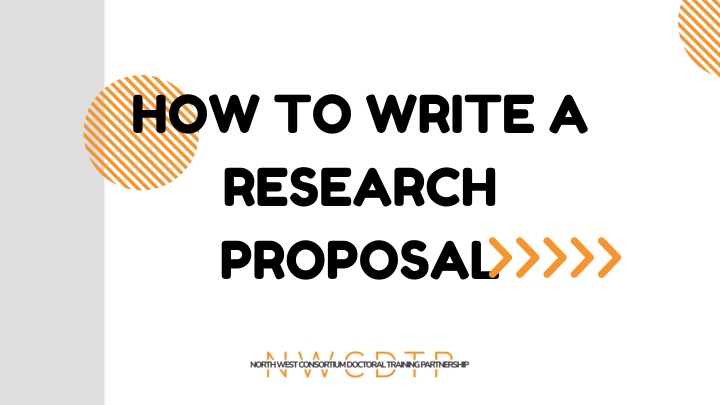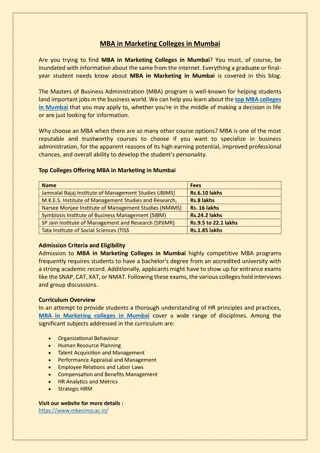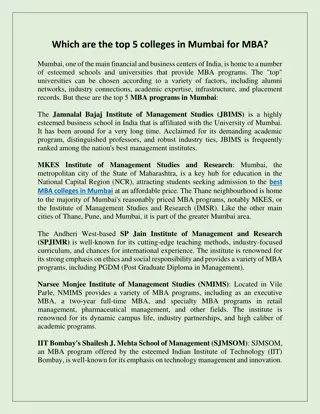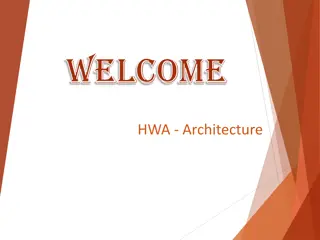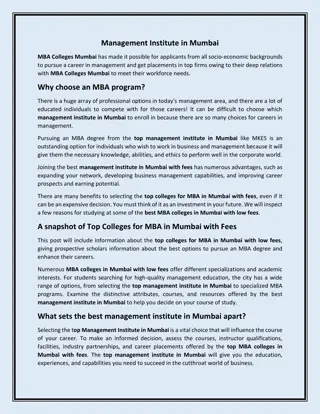Crafting Mumbai's Art Deco Architectural Legacy
Research proposal delving into the evolution of Mumbai's Art Deco architecture during the late-colonial period, exploring the influence of Indian agents on shaping a unique architectural identity amidst political, social, and nationalistic transitions. The study aims to uncover the historical narratives behind UK-trained Indian architects and the Bombay Improvement Trust's contributions to indigenous modernity through Art Deco constructions from 1930-47.
Download Presentation

Please find below an Image/Link to download the presentation.
The content on the website is provided AS IS for your information and personal use only. It may not be sold, licensed, or shared on other websites without obtaining consent from the author.If you encounter any issues during the download, it is possible that the publisher has removed the file from their server.
You are allowed to download the files provided on this website for personal or commercial use, subject to the condition that they are used lawfully. All files are the property of their respective owners.
The content on the website is provided AS IS for your information and personal use only. It may not be sold, licensed, or shared on other websites without obtaining consent from the author.
E N D
Presentation Transcript
HOW TO WRITE A RESEARCH PROPOSAL
WHAT IS A RESEARCH PROPOSAL A research proposal (RP) is intended to convince others that you have a worthwhile research project and that you have the competence and the work plan to complete it. Regardless of your research area and the methodology you choose, all research proposals must address the following questions: What do you plan to accomplish? Why do you want to do it? How you are going to do it? Introduction
MAIN COMPONENTS OF THE RP Background/Introduction Literature Review Aims and Objectives Research Questions Research Methodology Timeline Conclusion/Research Significance References and Citations Organizing your Research Proposal
INTRODUCTION/ BACKGROUND Background/Contextualisation The main purpose is to provide a background/contextualise your research problem. Place your research question in the context of either a current hot or topical area or an older issue that remains relevant even now. e.g., Identity, Climate change, etc. Provide the rationale why the issue of your choice has a contemporary relevance, and how it could add value to existing debates/fields of study (How to frame the research problem is perhaps the biggest challenge in proposal writing) Organizing your Research Proposal
LITERATURE REVIEW Literature review (Important to make your RP compelling!!!) Most research projects are built on the works of other authors and the opportunity to acknowledge, as well as to critically analyse, existing literature Done to highlight gaps in existing scholarship Its purpose is also to situate your research within the broader literature Synthesize what other authors are saying about the issue Add a conceptual framework that highlights the inter-relationships and connections between various themes (Literature review convinces your reader that your proposed research will make a significant contribution to the literature (i.e., resolving an important theoretical issue or filling a major gap in the literature)) Organizing your Research Proposal
AIM AND OBJECTIVES These are statements in 2-3 lines that suggest what you intend to examine and achieve during the course of the study e.g. The research would investigate how Mumbai s Art Deco Architecture was shaped by Indian agents to respond to various political, social, and nationalistic demands during the late-colonial period. Focusing on Art Deco dwellings built between 1930-47 by UK-trained Indian architects and BIT, the research aims to create a critical historiography of indigenous modernity , which connects the materials, process, design and patronage of buildings with broader socio-economic-political issues. It dialogically engages how individual dwellings, spatial practices and design are related to the wider networks of practices and ideas on modernization . Organizing your Research Proposal
RESEARCH QUESTIONS This is where the MAIN IDEA/QUERY of the research has to be outlined Questions emerge from research objectives All research questions must start off with a to and using words like examine , explore , understand Good to have 3-4 research questions (sharp, crisp, and flowing logically to understand inter-related issues) Usually expressed in bullet points for clarity Organizing your Research Proposal
RESEARCH METHODOLOGY How the research is going to be conducted (deductive/inductive/ quantitative, qualitative, mixed method, experiment design) Where is it going to be conducted? Rationale for selecting the fieldwork site(s) What constitutes data? (Archives/Sampling technique/sample size) and Data collection tools and techniques (primary/secondary, Interviews, surveys, FGDs) Data analysis (thematic, narrative, using softwares (SPSS) Mention, if ethical clearance/safety guidelines required/need to be considered Tentative timeline (literature review X months, Fieldwork/ Y months) Please Note that the methodology would be unique for your PhD- depend on your research questions and your discipline Organizing your Research Proposal
CONCLUSION Significance of the research, its originality, and how the findings of the research can add to existing knowledge or address a particular issue Explain why you are the best person to conduct this research Mention your previous work experience, and research that is related to the topic Familiarity with data collection tools, techniques Familiarity/association with the community/geography you are keen on researching (language, people, place, institutions etc.) Organizing your Research Proposal
REFERENCES Add references that have been cited in the proposal Depending upon your discipline, use the correct citation method Make a blend of recent literature with any key seminal texts Organizing your Research Proposal
EDITING Basic corrections (grammar, spelling, punctuation)- Use Grammarly Check for coherence and cohesion Editing your Research Proposal
USEFUL TIPS Start researching in your field of interest from both grey and published literature (newspapers, reports, preferably peer-reviewed books & journal articles) Jot down key themes/aspects of the problem/issue that fascinates you Think and write about the main objective/purpose of your research Write down the key research questions that the literature doesn t seem to address (Invest time in this bit!) If possible write sub-questions for each research question more clarity, helps in fine-tuning literature review, methodology Tips for your Research Proposal
USEFUL TIPS Discuss your research idea with seniors/teachers/peers who can understand your topic and perhaps give you feedback If possible, include reference(s) of the faculty/University Press with whom you intend to/where you want to research/associate with Be mindful of plagiarism (acknowledge authors, don t pass off somebody else s ideas as your own) Between 1000-2000 words (average 2-4 pages) Take enough time to read, write and re-write your proposal Use the university s help and guidance (contact the admissions team, potential supervisor, mentorship programme, etc.) Tips for your Research Proposal
THANK YOU Email: excy@liverpool.ac.uk NWCDTP
